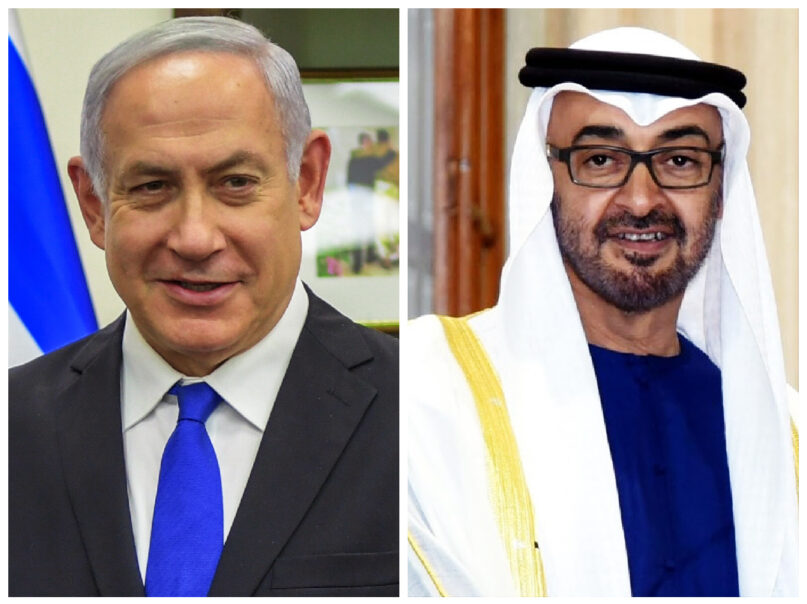
By Israel Kasnett
(JNS) A joint statement by U.S. President Donald Trump, Israeli Prime Minister Benjamin Netanyahu and Sheikh Mohammed bin Zayed Al Nahyan—the crown prince of Abu Dhabi—announcing the “Abraham Accord,” a peace deal between Israel and the United Arab Emirates, is the first since Jordan signed such an agreement in 1994. What does this deal include, and what does it portend for the future?
Richard Goldberg, a senior adviser at Foundation for Defense of Democracies, told JNS that “the peace agreement paves the way for full normalization of diplomatic, trade and travel relations between Israel and the UAE.”
But this is apparently only the start of a broader relationship between Israel and the Persian Gulf states.
Trump hinted as such during his statement to the press when he said, “I think you’ll be seeing some very exciting things, including ultimately with the Palestinians.”
Netanyahu also hinted at future diplomatic ties during his press conference when he said, “I believe there is a good chance we will soon see more Arab countries joining this expanding circle of peace.”
Joshua Krasna, an expert on strategic and political developments in the Arab world at the Jerusalem Institute for Strategic Studies, as well as a senior fellow in the Foreign Policy Research Institute, told JNS that “over the last few years, there has been a slow, but steady buildup in relations between Israel and the Gulf states. Israeli businessmen have been going back and forth for a while, and Israeli ministers have attended conferences.”
For example, former Transportation and Intelligence Minister Yisrael Katz visited Oman in 2018. Former Minister of Culture and Sport Miri Regev also visited the UAE that year.
“Since 2007, there has been a steady drumbeat of a message that Israel is improving its relations with moderate Arab countries,” said Krasna.
But the big change came in 2018 when Netanyahu went to Oman. At the time, there was a great deal of talk that a diplomatic breakthrough was expected imminently.
The joint statement said that the three leaders had “agreed to the full normalization of relations between Israel and the United Arab Emirates,” and Krasna noted that the United States and Israel seem to be touting full normalization as a closed deal.
Still, Bin Zayed wrote on Twitter that the deal means “cooperation and setting a roadmap towards establishing a bilateral relationship,” which is much softer and more ambiguous language.
Saudi Arabia has ‘biggest decision to make of all’
The Arab Peace Initiative, a 2002 Saudi-led proposal that called for Israel’s full withdrawal from the disputed territories in exchange for normalization with the Arab world as a starting point, has now been tossed out the window as clearly normalization has now come first.
According to Goldberg, Saudi Arabia now has “the biggest decision to make of all.”
If presumptive Democratic presidential nominee Joe Biden wins the U.S. election in November, Goldberg said “there are pro-Iran, anti-Gulf voices in the Democratic Party who will work to cut off U.S. arms sales to Riyadh next year.”
If so, he noted, Saudi Crown Prince Muhammad bin Salman will be “worse off politically if the UAE has a peace treaty with Israel and Saudi Arabia doesn’t.”
Goldberg even warned in an August 7 Newsweek article of the consequences for Saudi Arabia and the UAE if they don’t sign historic peace deals with Israel.
He wrote, “A Biden administration will be tempted to re-enter the Iran nuclear deal, returning to the Obama-era strategy of seeking a balance of power between the Islamic Republic and its Sunni Arab neighbors.”
He also wrote that “with Iran once again flush with cash from U.S. sanctions relief and importing advanced conventional arms from Russia and China, MBS [Bin Salman] and MBZ [Bin Zayed] will have only one true ally in the Middle East: the State of Israel.”
“Arab-Israel regional integration is critically important to isolate Iran,” he added in his comments to JNS. “Iran’s hold on the region will continue to weaken as its neighbors grow stronger both economically and strategically.”
With regard to Israeli military cooperation with the UAE, Goldberg said “this certainly opens the door for expanded bilateral military relations and perhaps even multilateral military exercises hosted by the U.S.”
‘A strong win going into the elections’
According to Krasna, this is a win for both the UAE and Israel as “the UAE can claim it got annexation taken off the table. Netanyahu can claim a major achievement on the wider Arab-Israeli conflict front.
As opposed to the joint agreement that says annexation has been “suspended,” Bin Zayed wrote on Twitter that “an agreement was reached to stop further Israeli annexation of Palestinian territories.”
During his press conference, Netanyahu emphasized that annexation is still on the table, and that he plans to go through with it.
But according to Krasna, the current political climate doesn’t allow Netanyahu to go ahead with it anyway, so with this deal, he “gets an elegant face-saving and significant reward for something he wasn’t going to be able to do anyway. He wasn’t going to be able to push the annexation, certainly not before the U.S. election.”
Krasna said this is also a win for the United States as it gives Trump a major foreign-policy achievement ahead of the U.S. elections.
“It will give him a very strong win going into elections,” he said.
Circling back to whether other Arab-world nations might follow suit and sign peace agreements with Israel, Goldberg said that over the last few years, “most people thought Bahrain would go first since they led the way on warming relations with Israel.”
He predicted that Bahrain will be next to jump-start a peace agreement with Israel.
“We should expect an announcement from Manama at some point soon,” said Goldberg, adding that he presumes other nations will follow suit.
Jewish and pro-Israel groups from both left and right laud Abraham Accord
By Jackson Richman
(JNS) Jewish and pro-Israel groups instantly applauded Israel and the United Arab Emirates for a peace deal on Thursday to normalize relations between the two countries. Dubbed the Abraham Accord, it is the first of its kind between Israel and a Middle Eastern country in more than 25 years, following Jordan and Egypt.
The American Israel Public Affairs Committee (AIPAC) called the development “a historic breakthrough for peace and reconciliation in the Middle East.”
“The establishment of full diplomatic relations between Israel and the United Arab Emirates represents a historic breakthrough for peace and reconciliation in the Middle East,” said AIPAC in a statement. “We greatly appreciate the efforts of [U.S.] President [Donald] Trump and his administration in facilitating this major diplomatic achievement.”
The lobbying group called on “other Arab states and the Palestinians to follow their lead” and for the Palestinian leadership to “end its boycott of Israel and America and return to the negotiating table.”
“In taking this historic step, the UAE is paving the way for additional Arab and Muslim states to normalize their ties with Israel, which can help transform the region and enhance the prospects for a true and lasting peace between Israel and the Palestinians,” said the Conference of Presidents of Major American Jewish Organizations in a statement. “This agreement is a bulwark against the forces of extremism and radicalism in the region.”
“We welcome the news about Israel and the United Arab Emirates normalizing relations,” Mark Wilf, chair of the board of trustees of the Jewish Federations of North America, told JNS. “The two countries have so much to gain from working together, and this decision could pave the way for greater recognition of Israel throughout the region and increase the prospects of peace.”
“This is a tremendously important and positive development,” B’nai B’rith International CEO Daniel Mariaschin told JNS. “The growing realignment of interests in the region will certainly contribute to stability in a chaotic neighborhood, and send a strong message to those who seek to promote that chaos that their efforts will not succeed.”
Zionist Organization of America president Mort Klein told JNS applauded the deal, saying “we hope other Arab states do the same. We look forward to UAE establishing its embassy in Israel’s capital, Jerusalem, and referring to Israel as the Jewish state.”
He added his expectation that “the suspension of declaring sovereignty over legal Jewish areas of Judea-Samaria is temporary and will soon move forward.”
It is currently unknown where the Emirati embassy in Israel will be located. Most countries have embassies in Tel Aviv. The United States and Guatemala are the only ones to have theirs in Jerusalem, both having relocated there in May 2018.
SUBHEAD: ’A precedent for formal relations with other countries’
Sarah Stern, founder and president of Endowment for Middle East Truth (EMET), called the development “a momentous day” and “a historic breakthrough.”
“This shows that another major Sunni Arab nation has finally come to accept that Israel is here to stay, and that it has a great deal more to gain by living and working side by side together and penetrating through the decades of old animosities,” she told JNS.
Jewish Council of Public Affairs president and CEO David Bernstein called the breakthrough “a great day for Israel and prospects for peace in the Middle East.”
“Israel has been quietly cooperating with Gulf states for several years,” he told JNS. “Normalizing with the Emirates sets a precedent for formal relations with other countries in the region as well.”
“All Americans, Democrats and Republicans alike should hail today’s Abraham Agreement. Today is a historic day—two allies of the U.S. now become open strategic partners in the region to thwart Iran and other Jihadists,” said Rabbis Marvin Hier and Abraham Cooper of the Simon Wiesenthal Center in a statement. “It also signals further dramatic normalization between Arabs and Jews in the region, a goal the [Wiesenthal Center] has contributed to for over 15 years.”
The American Sephardi Federation (ASF) posted on Twitter that the peace deal is a loss for Iran and its proxies, including Hezbollah.
“Reactionary forces (@khamenei_ir, Hizbullah, Hamas, Houthis) suffered a devastating defeat thanks to #UAE & @Israel’s new path to peace, prosperity, & progress, ending decades of conflict &, worse, the wasting of time & talent,” tweeted ASF.
SUBHEAD:’An important step towards peace’
Even organizations critical of the Trump administration’s Mideast policies hailed the peace agreement.
“Israel suspends annexation effort. UAE agrees to normalizing ties with Israel. This is an important step towards peace. Congratulations to the leaders of Israel and the UAE,” tweeted the Democratic Majority for Israel.
On Twitter, J Street touted that the deal temporarily stopped Israel’s plans to apply sovereignty to parts of the West Bank, also known as Judea and Samaria, though the left-wing lobby acknowledged the agreement as “steps in the right direction.”
“Let’s have no illusions, though: Full Arab-Israeli peace can’t be made w/o Palestinians or while ‘de facto’ annexation continues unabated,” tweeted J Street.
J Street welcomes both “suspension” of de jure annexation plans & normalization of Israel-UAE ties. Those are steps in the right direction.
“While this news is welcome, much better news would be an end to the Israeli government’s de facto annexation of the West Bank through ongoing settlement expansion and steps to reverse Israel’s occupation of the West Bank,” said Americans for Peace Now president and CEO Hadar Susskind in a statement.
“We are relieved to see President Trump’s dangerous gamble on unilateral Israeli annexation of the West Bank come to an end,” said Jewish Democratic Council of America board chairman and former Rep. Ron Klein (D-Fla.) in a statement. “By taking annexation off the table, today’s Israeli government announcement addresses the problem created by the Trump administration’s failure to oppose it from the outset.”
Israel, however, has said that sovereignty plans have only been suspended and not ended.
In a press conference on Thursday, Israeli Prime Minister Benjamin Netanyahu said he agreed temporarily to suspend sovereignty plans but is committed to carrying out the application in the West Bank, only in coordination with the United States.
U.S. support for Israel to apply sovereignty to parts of the West Bank would come “much sooner” than several years, according to officials.
Presumptive 2020 Democratic presidential nominee Joe Biden called the agreement a “historic step to bridge the deep divides of the Middle East.”
“The coming together of Israel and Arab states builds on the efforts of multiple administrations to foster a broader Arab-Israeli opening, including the efforts of the Obama-Biden administration to build on the Arab peace initiative,” he said.
Biden added that Israel applying sovereignty “would be a body blow to the cause of peace” and “virtually end any chance of a two-state solution that would secure Israel’s future as a Jewish and democratic state and uphold the right of Palestinians to a state of their own.”
Biden pledged that, if elected, he would “seek to build on this progress and will challenge all the nations of the region to keep pace.”








 Southern New England Jewish Ledger
Southern New England Jewish Ledger







